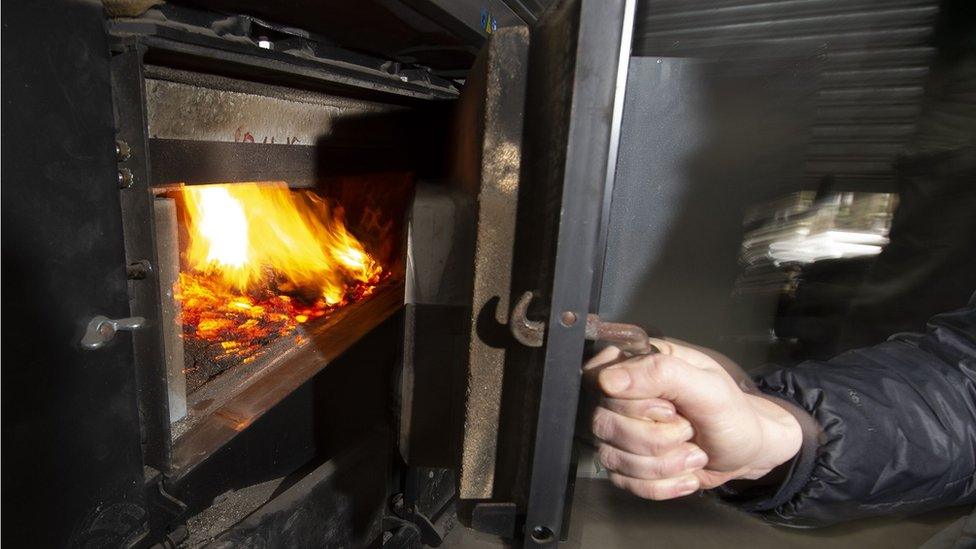RHI: Will the £13m public inquiry lead to meaningful change?
- Published
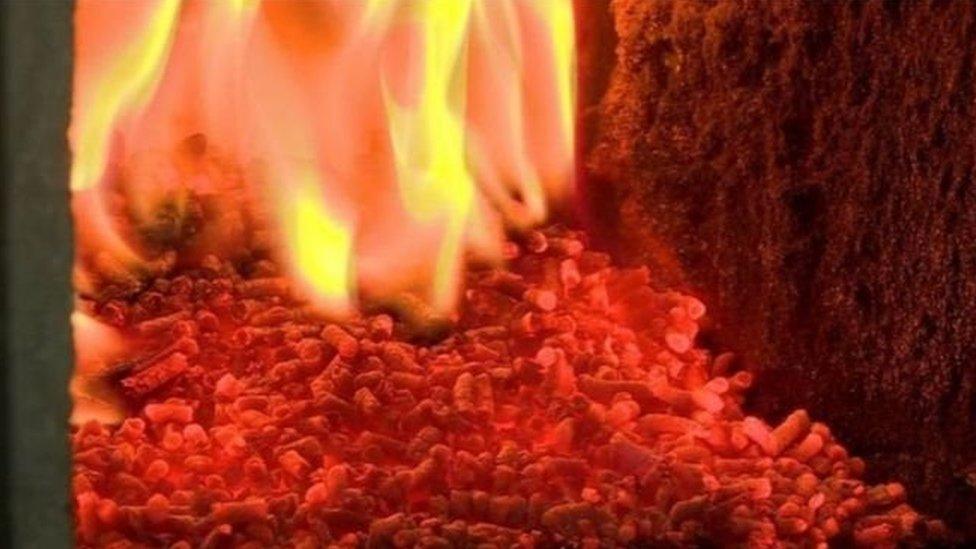
The RHI scheme paid businesses to switch from oil and gas to environmentally-friendly heating
The RHI inquiry was all about the cash - millions of pounds of taxpayers' money paid out by an overgenerous, poorly designed, badly run heating scheme.
But the eagerly awaited publication of the report on 13 March was overwhelmed by news of Covid-19.
As we waited to go into the Stormont senate chamber to read the embargoed findings, we passed Sinn Féin's Michelle O'Neill in the Great Hall announcing a unilateral U-turn and supporting school closures.
Confirmation of the first cases of community transmission of the virus ensured that a scandal, which had brought down the executive, dropped down the news agenda that day.
'No corruption'
The outcome - after all the intrigue of the hearings - was, for some, a damp squib.
The ruling that there had been no corruption surprised those who had anticipated findings of fraud and nepotism.
They believed politicians and business had been in cahoots to draw down what was viewed as "free money" from the Treasury.
An infamous phrase from the hearings, attributed to a former DUP special adviser, that he thought Northern Ireland could "fill our boots" did not help.
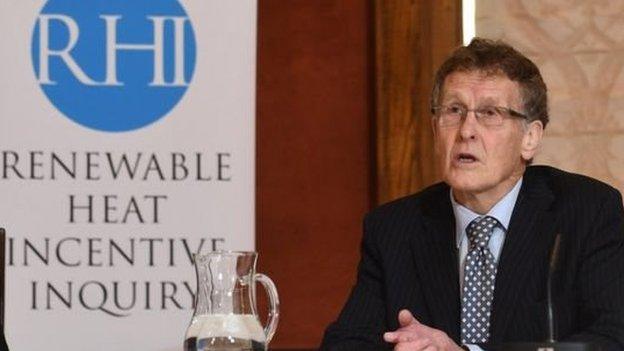
Inquiry chairman Sir Patrick Coghlin and his team made 44 recommendations from the inquiry
Inquiry chairman Sir Patrick Coghlin and his team presented a report which laid out how what should have been a dull heating scheme had collapsed the political institutions and threatened public finances.
The total bill for the inquiry was outlined last week.
When you add the legal and other costs to the bill for the departments called to testify, it gets you close to £13m - though the Finance Department quotes a lower figure of £11.5m.
Either way it is a conservative figure which takes no account of the huge amount of time publicly-paid civil servants spent complying with inquiry requests for evidence and information.
Which begs the question, was it all worth it and will anything actually change?
Sir Patrick and his team made 44 recommendations. They were centred on the capacity of the civil service and politicians to form policy.
Among them was a recommendation that Northern Ireland's top auditor be given the job of ensuring the recommendations were carried through.
Kieran Donnelly, who holds that office, brought some blinding clarity in his own evidence to the inquiry, with a searingly simple approach to public finances.
Civil servants, he suggested to Sir Patrick, should spend every penny of public money "as if it were their own".
Fundamental change
Mr Donnelly told me he expected to report the progress on implementing the recommendations sometime next year - acknowledging that Covid had delayed things.
Other work by his Northern Ireland Audit Office will be published in October and will address the capacity of the civil service to tackle complex policy initiatives.
"It's about the right people in the right place at the right time," he said.
He is not interested in box ticking when it comes to the recommendations, the important thing is to establish the extent to which there has been fundamental change.
"It's behavioural and it's the culture and it's the way business is done. It will need strong leadership and a step change of culture and that's harder to get a tangible hand on," he said.
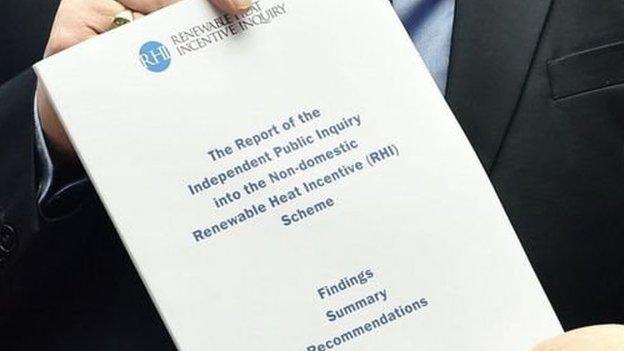
The RHI inquiry cost the taxpayer almost £13m for accommodation, legal costs and other expense for the inquiry team.
On the course run by Dr Karl O' Connor at Ulster University, the RHI Inquiry is now a teaching resource.
He runs a masters in public administration for civil servants - 30 of them a year.
He says the civil service must guard its independence from ministers jealously and that part of the problem with RHI was that politicians came to have too much sway.
There was an added complication, he said, a desire by public servants to "maintain the peace and stability of Northern Ireland" - something which isn't in the job description.
The failure to minute key RHI meetings was an example - something that should never have happened
The soon to be retired head of the civil service, David Sterling, said it was done to protect politicians, giving them a safe space to consider uncomfortable decisions, out of the reach of Freedom of Information requests.
'Disappointed and disillusioned'
RHI blighted some civil service careers, others have moved on and up.
Disciplinary proceedings are still active and the assembly will be informed when they've concluded.
What we do know is that any retired public servant is beyond the reach of that process.
And what of the businesses who installed the boilers - many of them in good faith?
They have seen their 20 year guaranteed subsidies chopped - something they're going to court to challenge.
"Has anything changed or will change? It doesn't look like it," one said.
They had hoped that the findings might vindicate them and overturn the early media narrative that scheme participants were money-grabbers, rather than people who'd been encouraged to join a government-backed scheme.
Boiler owners are said to be disappointed and disillusioned. For them the RHI inquiry was a frustrating experience and the money spent on it a waste.
As one put it: "£13m, for what really? That just about sums it up. A lost opportunity."
- Published7 September 2020
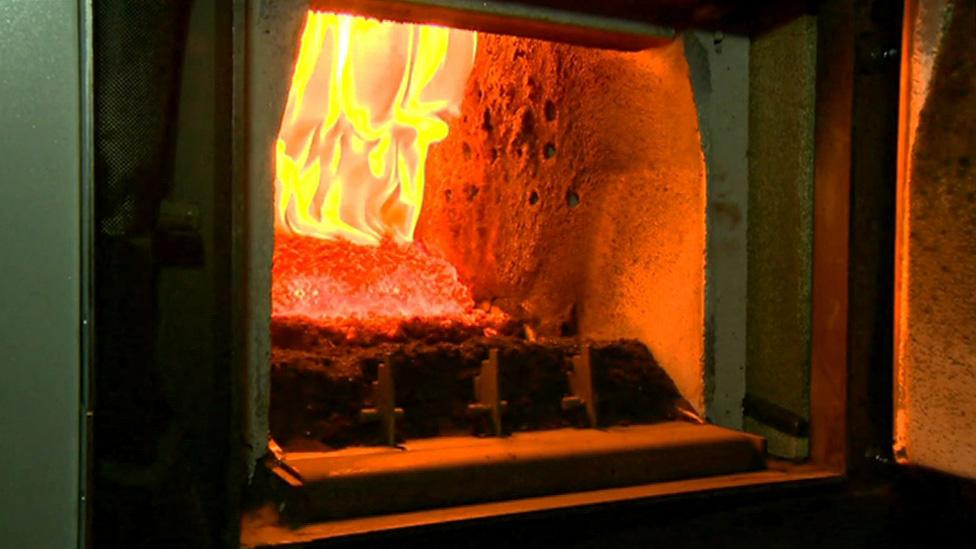
- Published3 June 2020
